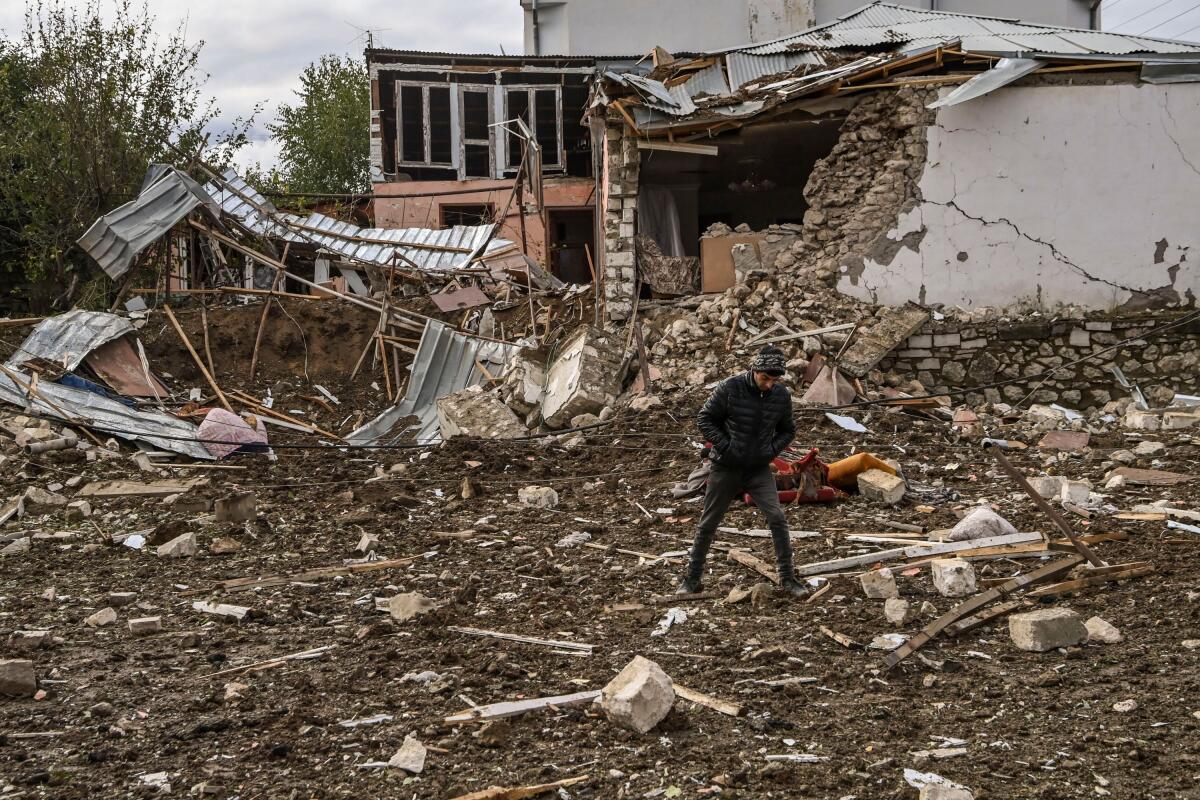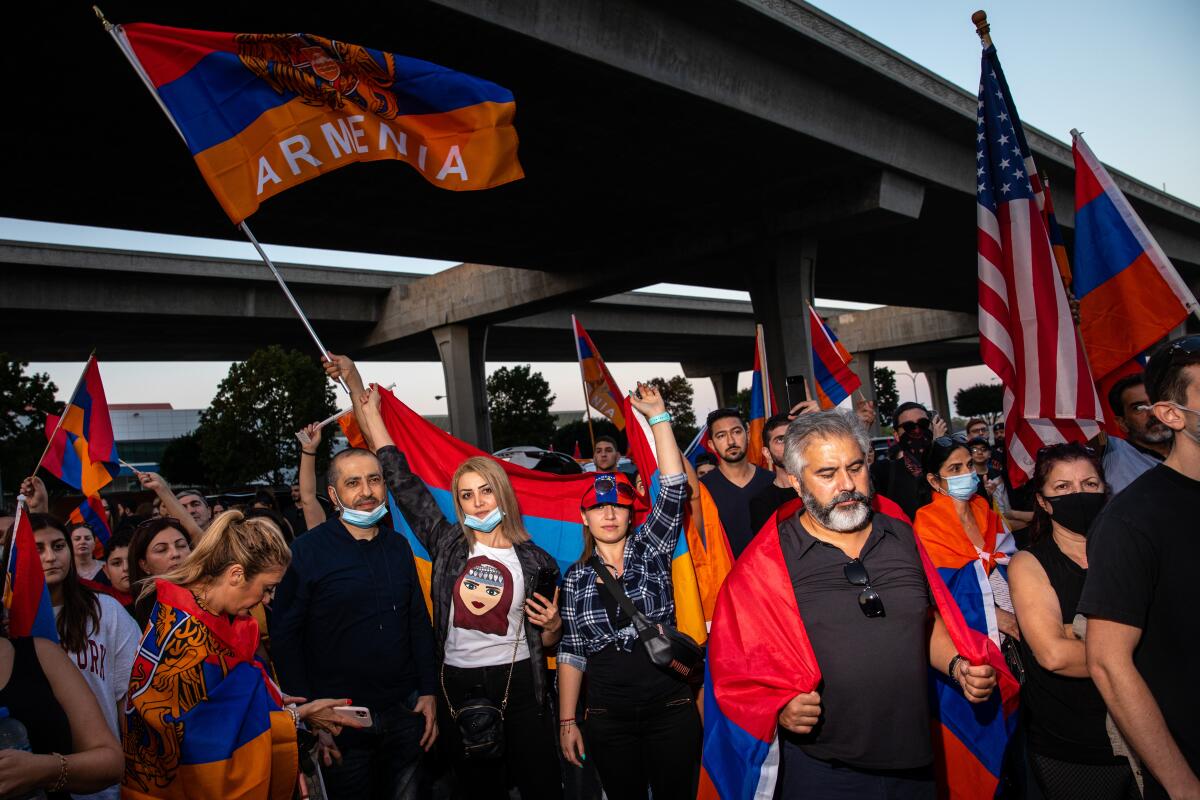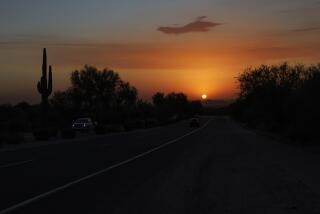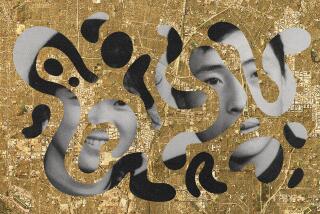Bound by duty and love, some L.A. Armenians are joining the battle lines in their homeland
- Share via
David Koroghlyan and his two boys were visiting family in Armenia when fighting broke out on Sept. 27 with neighboring Azerbaijan over a tiny separatist region on the border of the ex-Soviet republics.
Within days, Koroghlyan put his 10- and 11-year-old sons on a plane back home to Los Angeles. He was staying behind to join the fight.
Now training 12 hours a day with a volunteer group of soldiers, Koroghlyan could be called to the front lines any day.
“I’m not sure if they know that they might not see their dad again,” said his wife Susan, who asked that her last name not be used for safety reasons.
Koroghlyan is one of a number of Armenian Americans living in Los Angeles who have uprooted their lives — leaving loved ones and careers behind — to help their home country as it fights a reignited war for its claim to the ethnic Armenian enclave of Nagorno-Karabakh, which is internationally recognized as part of Azerbaijan. Armenians refer to it as Artsakh.

Thousands of Armenians have taken to the streets of Los Angeles to protest the hostilities, blocking major freeways and demanding politicians back their cause. But Southern California — home to the largest Armenian population in the United States — has also become a a central staging area for relief efforts.
The region has long been at the center of efforts to commemorate the Armenian genocide, and many believe the stakes are now very high for the future of their homeland. The fighting in the contested region touches many Armenian Americans on a personal level.
“Everyone either has fought and has memories of that, or lost someone and has memories of that. Or today has a cousin, a nephew, a neighbor, a somebody who’s there,” said Salpi Ghazarian, director of USC’s Institute of Armenian Studies. “So, you know, if my cousin’s going, my God, you know, what am I doing sitting here?”

Hostilities are now at their fiercest since an uneasy truce in 1994 ended a war over the region that claimed about 30,000 lives in the late 1980s and the early 1990s. Since that cease-fire, Nagorno-Karabakh has been self-ruled by ethnic Armenians, who make up the majority of the population of about 150,000.
Many local Armenians see echoes of the Armenian Genocide of 1915 in the current war, Ghazarian said. Turkey, whose ancestors Armenians blame for the genocide, has strong ethnic ties with Azerbaijan and has announced its support for its ally in the revived war.
“So all of us are somehow connected to this,” Ghazarian said.
Syuzanna Azizbekyan, 23, said it was great to see the rallying in Los Angeles, where she lives, but felt she could be of more use in Armenia, where she was visiting family when the war broke out. She decided not to board her scheduled flight back home on Wednesday. Instead, she’s staying in Armenia’s capital Yerevan, as a volunteer with the defense ministry helping with the humanitarian side of the war effort. Part of that involves relocating families fleeing the war zone, which is six hours to the south.
“My time is needed here. And my energy and effort is needed here more than I would be able to help there,” Azizbekyan said in a midnight video call from Armenia. “Our country is so small and our population is so, so small that I personally have been the hand that feeds.”
Just over a month ago, Azizbekyan was living with her parents and brother in San Gabriel, taking a break from studying for her pharmacy degree at West Coast University. Sometimes she said she scrolls through photos on her phone to see how different life was like before she decided to devote herself to the war.
Her fiance, Vardges Zakaryan, a Glendale resident, said he supports her decision.
“Originally, I was kind of shocked. At the end, we both talked it out and I was pretty happy she wanted to stay,” Zakaryan said. “To be honest, I wish I was there to help out.”
Both Zakaryan and Azizbekyan were born in Armenia and moved to the U.S. as teens after securing green cards. They met while she was working at an AT&T store in Glendale. After dating for about three years, they got engaged in Las Vegas just before the pandemic swept over the U.S.
They’re now planning their wedding while more than 7,000 miles apart — across an 11-hour time difference.
Although Azerbaijan’s population is about triple that of Armenia, a relatively small number of Azerbaijani Americans live in California, with higher concentrations up north, according to members of the community.
Ulduz Azar, an officer of the Azerbaijan Cultural Society of Northern California, said her local community in San Francisco has also been raising money to send to Azerbaijanis who have lost family members or whose homes have been destroyed.
“We’re all very, very worried and tense,” Azar said. “We are trying to do our best to help those who are impacted.”
Laurence Broers, a scholar on the conflict, said Azerbaijan instigated this attack. However, he said the country still sees it as a defensive war — to reclaim lost land. Azerbaijani officials view the contested territory — as well as seven adjacent districts — as belonging to Azerbaijan.
Nasimi Aghayev, Azerbaijan’s consul general in the Western U.S., said about 800,000 Azerbaijanis were forced to flee their homes as a result of the war that ended in 1994. Aghayev accused Armenia of working in concert with Russia, which has a military base on Armenian soil.
Urged by European Union leaders alarmed by the escalating conflict threatening to draw in regional superpowers, talks were planned this week among the U.S., France and Russia in Geneva. Neither Azerbaijan nor Armenia have signaled that a cease-fire is near. Both sides see the land as theirs.
As of now, Azizbekyan’s return flight is scheduled for Monday, but she said there’s no guarantee she’ll get on the plane.
“I told myself I wouldn’t leave until the war was done, just so I could celebrate,” Azizbekyan said. “Because that’s what that’s what we’re all waiting for — just that one day where they say, ‘Hey, it’s over. The boys are coming back home.’”
Susan, the wife of David Koroghlyan, was born and raised in Glendale — home to the largest Armenian community in Southern California. She said she would make the same trip her husband did if she didn’t have her small boys to worry about. She said she isn’t sleeping much. Every 30 minutes, she checks online for updates about the fighting.
Now, with her husband overseas, she is about to say goodbye to her brother, George Avakian, too.
Avakian, a real estate agent living in Monrovia, is frantically gathering supplies to bring over to Armenia to help soldiers and civilians alike. He plans to leave in a few days.
Avakian, 34, said his family has been in the U.S. since the late 1960s. They were one of the first Armenian families in Glendale and watched the city transform, he said.
But no matter how many miles they put between their homeland and themselves, the conflict with Azerbaijan over Nagorno-Karabakh has never seemed far away.
“Everybody my age, and after, grew up with this. This has been looming over our heads,” Avakian said. “So, here it is, a resolution. Here’s a chance.”
There is anxiety and worry. Avakian is leaving a fiancee. He’s in the middle of closing house sales and a mountain of paperwork that he needs to wrap up and hand off.
But there’s also relief, Avakian said.
“Have you ever had a moment where you figured out exactly what you were supposed to do?” he said. “That’s it.”
Some, like Glendale resident Alec Baghdasaryan, would like to travel to help in the campaign. But at 62, he said he can’t risk getting infected with the coronavirus while traveling to Armenia, let alone to the besieged separatist region, where he operates a branch of a software company and co-owns a hotel.
This past week, he found out devastating news. Kevork Hadjian, his close friend of nearly a decade, died after volunteering to fight on the front. Baghdasaryan called Hadjian “truly a beautiful person.”
A tenor, Hadjian frequently sang for children at a poetry festival Baghdasaryan organized at his hotel in the city of Shushi. Hadjian was supposed to sing at a church event in Glendale this past spring, but the event was canceled due to the pandemic.
“You know, as a human being, you don’t want any human being to get injured. Either side,” Baghdasaryan said. “It’s sad that situations like this come up and you cannot find a solution peacefully.”
More to Read
Sign up for Essential California
The most important California stories and recommendations in your inbox every morning.
You may occasionally receive promotional content from the Los Angeles Times.











